Girls speak out: Eight voices rewriting their futures

What you need to know:
- From rural villages to urban centres, Kenya's girls are defying odds and dreaming big.
- Despite facing challenges like poverty, cultural barriers, and limited resources, these young women are leveraging education and technology to shape their futures.
- Their stories showcase a generation of girls determined to break gender stereotypes in fields ranging from Stem to politics.
Aspiring nurse and advocate for women's empowerment
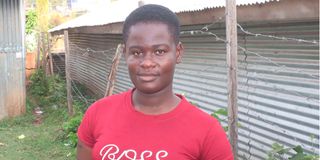
Irene Akinyi during an interview with Nation.Africa on October 8, 2024 in Homa Bay.
My name is Irene Akinyi, and at 19, I'm brimming with dreams for myself and for the women of Kenya. I hail from Homa Bay, where I recently completed my Kenya Certificate of Secondary Education exams at St Julian Ugari Mixed Secondary School in Migori. During my studies, I fell head over heels for Biology, especially the captivating world of hormones.
Nursing is my calling. I believe it's my path to making a real difference, particularly in reducing the high maternal and infant mortality rates in my county. I long to assist women during childbirth, to be that reassuring presence in a moment so critical yet so fraught with risk in our community.
As I eagerly await my chance to join college next year, I'm not sitting idle. Every day, I wake up at 5am, tidy our home, and head to my job at a food kiosk in Homa Bay Town. From 6am to 3pm, I'm on my feet, preparing meals and serving customers. It is hard work, but the Sh250 I earn daily edges me closer to my goal. I'm saving every cent I can to help my parents with my college fees and to buy the personal items I'll need.
But my aspirations stretch far beyond my own career. I dream of a Kenya where women stand shoulder to shoulder with men in leadership roles. Right now, the lack of women in top positions gnaws at me. From our president to most governors, men dominate the political landscape. This imbalance seeps into state offices and private organizations too.
It reminds me of the stories we read in literature class, tales of women suffering simply because men monopolised leadership positions. Sadly, this fiction mirrors our reality in Kenya today. Yet, I'm not without hope. My own county of Homa Bay has taken a step in the right direction by electing Governor Gladys Wanga. She's more than just our governor; she's my role model, a beacon for aspiring female leaders across Kenya.
I firmly believe that education is the great equaliser. The outdated notion that boys should be educated before girls needs to be thrown out with yesterday's trash. Every child, regardless of gender, deserves an equal shot at education. That's why I champion for more support for girls' education, all the way to the highest levels.
To my fellow girls, I say this: take your studies seriously. It's our ticket to competing on an equal footing with men.
But education alone isn't enough. We need to tackle the triple threat that holds back so many girls in Homa Bay: early pregnancy, HIV/Aids, and gender-based violence. My heart aches every time I hear of another teenage girl lost in childbirth. I stand firmly behind our government's efforts to end gender-based violence and stop new HIV infections.
These challenges often stem from the same root: the unfair treatment of women by some men. I believe we can create a truly great society, but only if we confront and overcome these issues head-on.
As I work towards becoming a nurse, I'm also committed to advocating for women's empowerment. I envision a Kenya where women have the same opportunities as men in leadership, education, and all walks of life. It's a big dream, but I'm determined to play my part in making it a reality.
Tech trailblazer: Mission to revolutionise Stem for girls
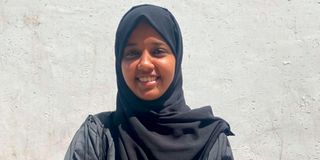
Gheida Abdala outside her home in Mombasa on Monday October 7, 2024, when she spoke to Nation.Africa.
My name is Gheida Abdallah, and I'm 21 years old, pursuing a degree in Information Technology at the Technical University of Mombasa. I come from Malindi in Kilifi County, Kenya, and I've dedicated myself to becoming a young scientist, mentor, and advocate for girls' education and empowerment, especially in STEM fields.
My typical day starts early, preparing for school. I attend lectures in the morning, usually finishing by noon. After group discussions, I break for prayer and lunch. Afternoons are dedicated to my organization, planning meetings or participating in talks. I keep this time flexible for various engagements. My day ends with at least an hour of evening study.
My journey into STEM began in high school when I developed a web-based application to assist girls and women facing gender-based violence. This project, inspired by the alarming number of early marriages in my community, opened my eyes to technology's power in addressing social issues.
"My vision is to establish a STEM start up," I often say, "because I believe in the power of tech to solve problems. I want to create a hub that supports girls in building solutions. Girls don't always have the best resources, but with support, they can change the world."
Growing up in an Arab community where girls' education wasn't prioritized shaped my ambition. "I want to be the change where I come from," I explain. "Girls weren't given the same opportunities, and I knew that if I wanted to see change, it had to start with me."
I launched a mentorship program for high school girls, with 90 percent of participants enrolling in STEM courses at university. I also run an online program to shift mind-sets and encourage girls to explore STEM possibilities. "To reach them, we need to change their mind-set first," I believe. "Once their mind-set shifts, they can conquer anything."
But I understand that girls face additional barriers. "Many girls don't attend school because of a lack of funds or basic necessities like menstrual hygiene products," I point out. These obstacles fuel my determination to find solutions and secure funding for my initiatives.
Looking to the future, I envision a world where girls can fully realize their potential, build their own start-ups, and lead in spaces traditionally dominated by men. "The cultural norms that hold girls back need to change," I assert. "We haven't broken the glass ceiling yet."
If given the opportunity, I would love to work for the United Nations. I believe their community-centred mission and Sustainable Development Goals align with my passion and would allow me to contribute meaningfully while representing my country in global advocacy efforts.
I really admire Dr Taiba Hakimy, the founder of Baus Taka. As a woman in STEM and a strong advocate for girls' involvement in environmental issues, she inspires me to push forward in my own field.
I'm honoured to be a recipient of the Global FRC Scholar award and a winner of the Pwani Awards 2023. As I continue my education and advocacy, I hope to pursue a master's in innovation abroad. I've been inspired by Dr James Mwangi, CEO of Equity Bank, who taught me about resilience and leadership. I'm grateful to have been a beneficiary of the Wings to Fly scholarship that landed me at Matuga Girls, where I harnessed my leadership skills.
I believe education is a powerful tool that opens minds, encourages critical thinking, and equips girls to become problem solvers. Advanced skills in AI, engineering, machine learning, and digital literacy are crucial for the future. Technology creates an open environment where girls can thrive, build solutions, and address societal challenges more effectively.
To me, gender equality means creating a space where both boys and girls have equal opportunities and can make decisions that affect society. It's about trusting both genders equally in leadership, the economy, and other critical aspects.
As a future leader, I aspire to serve people with integrity, keep my promises, and truly commit to making a difference. My message to girls is simple yet powerful: "Be the change you want to see in your communities. It has to come from you." With unwavering commitment, I'm determined to pave the way for more girls to thrive in STEM and beyond.
Beauty, brains, beating the odds and Samburu success story
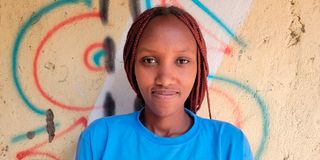
Cecilia Ekeno, 20, at their home in Maralal town, Samburu County.
My name is Cecilia Ekeno, a 20-year-old from Loikas village in Maralal town. My days are often busy, but I've settled into a routine that keeps me balanced and focused on my goals.
I usually wake up around 7am, starting my day with prayer - God is our guardian, after all - before preparing breakfast. By 8am, I'm helping with household chores. My mother has been dealing with a long-term illness, so my sister and I share the responsibilities to keep our home running smoothly.
Around noon, I meet up with friends in Maralal town. We love practicing dance moves, especially those trending on TikTok. Afterwards, I'll either hit the gym or join a yoga session with friends. These activities help me relax and clear my mind.
Evenings are dedicated to family time. I prepare supper - pilau is my favourite - and spend quality time with my mother. Before bed, I unwind by listening to music or watching TikTok clips. By 10pm, I'm ready to rest and prepare for another day.
I completed my Form Four two years ago, with Christian Religious Education as my favourite subject due to its valuable life lessons. Although I haven't joined a tertiary institution yet, I'm determined to succeed in life. I'm particularly drawn to beauty therapy as a potential career path.
Life hasn't been without its challenges. School was tough due to financial constraints. Coming from a humble background and raised by a single parent who's often hospitalised, my sister and I have faced difficulties in our academic journey. Despite these ongoing challenges, I believe better days are ahead for our family.
Given the opportunity, I'd work to change how men perceive women and girls in my community. We live in a patriarchal society where women's voices are often overlooked. However, I see hope for the future. Looking back, women's participation in politics in Samburu County was non-existent. Today, several women hold crucial positions in politics and administration.
I admire our Member of Parliament, Naisula Lesuuda. As a trailblazer, she inspires many young girls in Samburu County. Her approach to community issues and her motivational talks in schools and villages have been truly inspiring.
My message to girls worldwide is simple; never give up on your dreams, regardless of your circumstances. I, too, have aspirations to become a strong, independent woman. Education has proven to be a great equaliser, especially in Samburu. We're seeing more girls achieve excellent grades in school and women participating in key decision-making processes.
I believe computer skills will be vital for our generation in this competitive world. Other skills like mechanical engineering are also proving valuable for women.
To me, gender equality means equal treatment and representation for all. While we're not there yet, I believe we're on the right path. One day, I hope to become a woman representative, using that position to help girls and women in Samburu. Understanding first-hand the challenges they face daily, I believe I could make a real difference.
Little doctor, big dreams: Victoria's path to healing her community

Victoria Akinyi Lwanga during an interview with Nation. Africa at Victoria Primary School on October 4, 2024.
My name is Victoria Akinyi Lwanga, a 12-year-old Grade Seven pupil at Victoria Junior Secondary School in Kisumu County. As we mark the International Day of the Girl, I'd like to share my story and hopes for the future.
On school days, I wake up at 4:45am to study, prepare, and have breakfast before leaving for school. I arrive by 6:15am and return home around 6pm. On weekends, I wake up later, help with house chores, and find ways to have fun at home.
Agriculture is my favourite subject because it's easy to understand and I can see tangible results during practical sessions. This hands-on experience has inspired my passion for making a difference in people's lives.
When I grow up, I dream of becoming a physician and working with humanitarian organisations to provide healthcare to those in desperate need. To achieve this, I'm committed to studying hard and excelling in my academics. My goal is to enrol in a good high school and eventually join a university to study medicine.
After completing my medical studies, I hope to work as a doctor and eventually run my own hospital as a way of giving back to society. I also have a vision to empower young girls, especially in rural areas. Many girls simply need a mentor to provide hope, guidance, and encouragement.
Today, I encourage girls to believe in themselves and keep hope alive despite the challenges they face. I believe each person is uniquely created and has potential, regardless of their circumstances. I want to be at the forefront of motivating, mentoring, and helping girls access opportunities they need.
Girls face various challenges, including safety concerns, low self-esteem, and peer pressure. Personally, I struggle with painful menstruation.
Education is crucial for girls, as it provides knowledge, skills, and career guidance. It shapes our attitudes, decision-making abilities, and exposes us to various life opportunities.
Essential skills for girls' future success include life skills, general knowledge, understanding current trends, and embracing technology. Technology plays a significant role in empowering girls by facilitating communication, learning, and showcasing talents.
Regarding gender equality, I believe there's still work to be done. While girls were initially left behind, now boys are sometimes forgotten. In my opinion, both genders should be empowered and given equal opportunities to excel.
I'm proud to see women excelling in fields once dominated by men, such as CEOs, engineers, doctors, teachers, politicians, accountants, lawyers, and judges. Their success inspires me to pursue my dreams and make a difference in the world.
Balancing books and baby: Lucy's tech-powered path to success
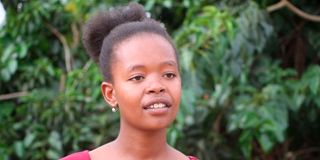
Lucy Ndunge, 21, during an interview with Nation.Africa in Kibwezi Town in Makueni County on October 7, 2024. She identifies Suba MP Millie Odhiambo as her role model.
My name is Lucy Ndunge, and I'm 21 years old. I hail from Machinery Township in Makueni County. Currently, I'm in my first year at Kibwezi Teachers Training College, studying Information Communication Technology. Though it may not be apparent, I'm one of the students carrying the heaviest responsibilities, as I have my own family.
I'm married to my former secondary school teacher, and we're blessed with a child. My days are a delicate balance of marital and parenting duties alongside my studies.
My story begins a decade ago with the death of my mother. She was a single parent without a place of her own, so we lived with my grandparents. As her only child, my world crumbled when she passed away while I was in Class Six. When I needed parental love the most, I faced rejection from some relatives. Abject poverty loomed over me, threatening to end my education. At times, I had to draw water for wealthy neighbours to earn enough for a meal and sanitary towels. It's a wonder my self-esteem survived as I navigated through school.
After completing secondary school, I enrolled in a human resources management course at another college. However, just before sitting for an exam, I became a mother and deferred my studies. I had hoped to resume where I left off, but I quit when the college demanded unreasonable fees upon my return. Fortunately, I've now enrolled in my dream course. Mathematics was always my favourite subject in school, and I've long aspired to become a computer technician.
I believe education is the most effective way for girls to reach their full potential. Without education, one is often looked down upon. In rural family gatherings, for instance, uneducated women are typically tasked with fetching water, arranging seats, and running errands for their educated relatives. An educated girl commands respect in society and is empowered to face the world confidently.
Suba North MP Millie Odhiambo is my role model. Disregard the "bad girl" label she's given; as she dances gracefully to trending songs, she exudes influence. Her courage is admirable. Nothing can deter her from voicing her opinions, even when she's wrong. She's incredibly brave! Armed with such courage, I feel I can face anyone, any challenge, and anything that comes my way.
With role models like Millie, the future looks bright for girls in Kenya. In fact, there are already concerns that girls have surpassed boys in terms of empowerment. I've noticed some boys struggling with low self-esteem, and society needs to address this.
In the next decade, I envision a country where gender equality is the norm. We're not there yet. Today, girls are more vulnerable to poverty and cultural stereotypes than boys. Some communities still prioritise boys' education over girls', arguing that educating girls is a waste of resources since they'll eventually marry into other families. In my opinion, the most crucial skills girls need are communication and computing skills. Being tech-savvy unveils a world of endless possibilities for girls in our rapidly changing world. Artificial intelligence is already here, and as girls, we need to familiarise ourselves with these emerging technologies to remain relevant.
I'm working towards giving my family the love I missed as a girl. In the future, I aspire to be a leader who cares, who is available and committed to service delivery. I'll support both boys and girls to thrive, helping to make our society a beautiful place to live.
16km to freedom: Esther's daily trek towards a brighter future
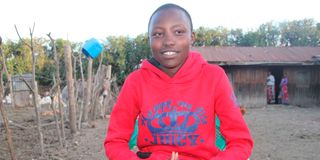
Esther Morijo, a Form Two Student at Chumvi Day Mixed Secondary School during the interview on October 7, 2024 at her aunt's home at Matangi village in Laikipia County.
My name is Esther Morijo, a 15-year-old from Matangi village in Mukogodo East Ward, Laikipia County. I'm the firstborn in a family of two boys and two girls. Currently, I live with my maternal aunt, having relocated after joining Chumvi Day Mixed School, as my parents' home is over 30km away.
My journey to secondary school was uncertain, but thanks to my determined mother, I got this chance. Nearly at the end of the first term of 2023, when I was 13, my mother "abandoned" me at a new school with nothing but a single pair of school uniforms. She was worried that if I failed to transition to high school, I could easily fall victim to Female Genital Mutilation (FGM) or child marriage. Teachers and other well-wishers stepped in to help me, and a relative living near the school offered to accommodate me to avoid the 40km daily journey.
On weekdays, I wake up at 4:30am to prepare breakfast. By 5am, I begin my eight-kilometre trek to school through the plains, arriving around 6am. This has been my routine since March 2023, when I joined the school through the support of well-wishers. My parents lack the means to finance my education.
Initially, I found the daily 16km round trip to school strenuous, but I've grown accustomed to it. I focus all my energy on education, particularly on my two favourite subjects: Mathematics and Business Studies. I enjoy these subjects as I believe they'll play a crucial role in achieving my dream of becoming an accountant and later establishing my own business to support my family.
Although I devote most of my time to studies, I still assist my aunt in the evenings and on weekends with milking goats and preparing supper. I make sure to spare at least an hour for studying or completing homework before bed.
Compared to most girls in my community, I consider myself fortunate to have a supportive family, even though a charitable organisation finances my education. They learned of my plight through a local organization called Mukogodo Girls Empowerment Program. Some challenges facing girls in my community include FGM, teen pregnancies, and child marriages. We also lack adequate boarding schools, with only scattered day schools available, poor roads, scarce water, and no electricity.
My role model is our MP, Sarah Korere, who is passionate about girls' education. She visits our school to mentor us, and I admire how she speaks courageously in front of men, warning them that anyone subjecting their daughter to FGM or early marriage will face arrest. She has also supported the construction of several classrooms at our school through NG-NDF.
Our MP has shown that women can be effective leaders, even within pastoral communities. I aspire to emulate her by becoming an MP or even a government minister. Women's representation in political leadership is still below expectations, and women must fight fearlessly for these positions.
To other girls, my message is never to give up despite the many challenges. Education is the key to a prosperous future. Although students in rural, marginalised areas are disadvantaged in accessing modern information technology for learning, I believe this will change in the next ten years. In the meantime, we must use what's available to achieve our best and not let anything stand between us and our dreams. Nearly two years into my education, I now rank among the top-performing students in my class. I have big dreams!
Turkana's tech champion and her fight for digital equality
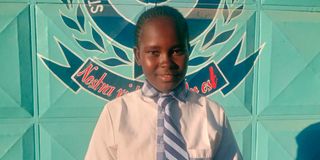
Anjela Tukei, 15, the President of St Monica Lodwar Girls Comprehensive School in Turkana County, when she spoke to Nation.Africa at the school.
My name is Anjela Tukei, and I'm 15 years old. As the School President at St Monica Lodwar Girls Comprehensive School in Kenya, I represent over 1,600 girls who, like me, deserve a bright future. We believe our dreams are valid, whether we aspire to be doctors, artists, or any other profession.
In my home region of Turkana, we face challenges like early marriages. Girls in villages are often married off to wealthy, much older suitors. This practice stems from the belief that girls are a source of wealth rather than individuals deserving education. At my age, I've seen friends forced into these situations, and it's heart-breaking.
I call on our leaders to visit villages and convince parents to send their daughters to school. Education opens doors to various careers - from paediatricians and neurosurgeons to news anchors and lawyers. For families struggling with school fees, the government should provide support through business capital or job opportunities.
At St Monica's, we're lucky to have dedicated teachers, but we face technological challenges. Sometimes, an entire class shares a single teacher's phone for digital learning. We need computer labs in every school to compete globally. I dream of a day when each of us has access to a computer, opening up a world of knowledge at our fingertips.
I'm grateful that our government provides sanitary towels to schoolgirls, allowing us to focus on our studies. However, I worry about girls who don't attend school and often lack access to these essential items.
To promote gender equality, we need more encouragement and mentorship, particularly in fields like engineering. I'm fortunate that Unesco selected our school to host a Stem and ICT mentorship program. This initiative aims to inspire secondary school girls like me to embrace science subjects and related careers.
Girls in Turkana face social stereotypes, cultural norms, and economic barriers that hinder our participation in Stem fields. These stereotypes often portray Stem as masculine, discouraging girls from pursuing these interests. We need women leaders in engineering and ICT to visit our schools and inspire us.
As we celebrate the International Day of the Girl Child, I urge our government to ensure all schools have electricity and digital gadgets for interactive learning. With internet access, we can read extensively and broaden our horizons. Let's create an environment where every 15-year-old girl can dream big and have the tools to achieve those dreams.
We, the girls of Kenya and the world, have a right to a bright future. It's time for everyone - parents, government officials, and society at large - to support us in reaching our full potential. Our dreams are valid, and with the right support, we can turn them into reality.
Science, chess, and social change: Elizabeth's triple threat strategy
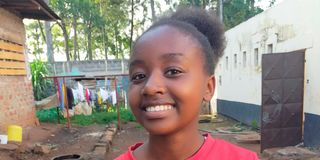
Thirteen-year-old Elizabeth Cassidy, speaks to Nation.Africa at her home Kitale in Trans Nzoia County.
My name is Elizabeth Cassidy, a 14-year-old from Kitale, in Trans Nzoia County. I attend Kitale Progressive Comprehensive School and have big dreams for my future.
Every day, I wake up at 6am to help my parents with chores, including feeding our chickens. This morning routine allows me to bond with my family while learning about responsibility. I then head to school for classes that begin at 8am. I have a passion for learning, with science and math being my favourite subjects. Their emphasis on critical thinking fascinates me.
My love for problem-solving extends beyond the classroom. I'm a proud member of the KCB Chess Club, where chess has become an integral part of my life. However, as a girl who plays chess, I face significant challenges. The sport is often seen as male-dominated, and many believe girls should focus on traditional activities. This mind-set can be discouraging, especially when competing in predominantly male environments. The lack of female chess role models in my village adds to the challenge.
However, I'm determined to break through barriers and inspire other girls in my community.
If I could change one thing to improve life for girls in my country, it would be the perception that education and sports are more important for boys than girls. I firmly believe every girl deserves equal opportunities to learn and chase their dreams.
The woman I admire most is Jennifer Shahade, a renowned US chess champion and advocate for gender equality. Her success is impressive, but what truly inspires me is her dedication to promoting girls' participation in chess. Her work proves that through determination and advocacy, we can break down barriers and inspire future generations of girls.
To me, gender equality means giving everyone the same rights and opportunities, regardless of gender. While we're making progress, there's still a long way to go, especially in rural areas. In the future, I aspire to be a compassionate leader who advocates for positive change, especially for girls and women.
My message to girls around the world, is to believe in yourselves and never give up on your dreams. No matter where you come from, you can achieve anything with hard work and determination. I envision a world where girls are recognised for their talents, regardless of their background.
My biggest dream is to study medicine abroad and return to my community to provide quality healthcare. I also aspire to become a source of motivation for girls and women, making the world a better place with equal opportunities for all. As a chess player, I hope to represent Kenya in the Chess Olympiad and see more girls competing alongside me.
I believe education is the key to unlocking opportunities. It equips girls with the knowledge and skills needed to make informed decisions and pursue their passions. Technology will also play a significant role in shaping the future for girls in Kenya, providing access to information and resources that were previously unavailable, connecting us to a global community, and opening up new career paths.
Today, I want to remind everyone that girls like me have the potential to change the world.
By George Odiwuor, Jurgen Nambeka, Geoffrey Ondieki, Elizabeth Ojina, Pius Maundu, Mwangi Ndirangu, Sammy Lutta, Evans Jaola
[email protected], [email protected], [email protected], [email protected], [email protected], [email protected], [email protected]



